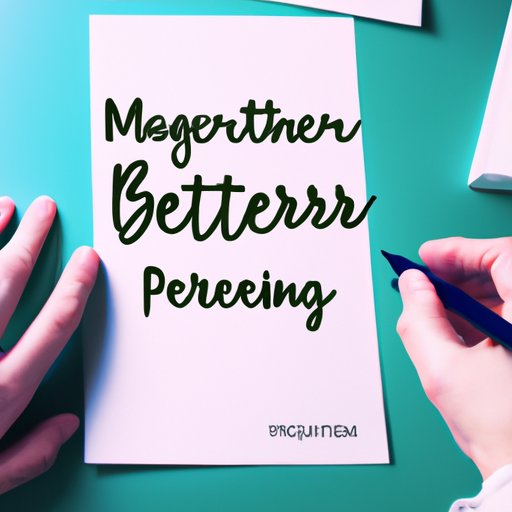
Introduction
Do you ever feel like there’s something missing in your life, something you can’t quite put your finger on? Or perhaps you know exactly what’s wrong, but you just can’t seem to make a change? Whatever the case, becoming a better person starts with small daily habits that accumulate over time. In this article, we’ll explore six key areas for personal growth and development, and share actionable tips on how to incorporate them into your daily life.
Practicing Mindfulness
Mindfulness is the practice of being present in the moment, without judgment. This can involve anything from deep breathing exercises to meditation, but the key is to focus on the present and let thoughts come and go naturally. Studies have shown that mindfulness can lead to reduced stress and anxiety, improved focus and decision-making, and even physical health benefits.
To practice mindfulness in your daily life, start by setting aside a few minutes each day to simply breathe. Sit comfortably with your back straight, and focus on inhaling and exhaling deeply. When your mind wanders (as it inevitably will), gently bring it back to the sensation of your breath. You can also practice mindfulness in everyday activities, such as washing the dishes or taking a walk, by focusing on the physical sensations involved without letting your mind wander.
Practicing Gratitude
Gratitude is the act of acknowledging and appreciating the good things in life, no matter how small. Studies have shown that individuals who regularly practice gratitude experience increased happiness, improved relationships, and better physical health.
To incorporate gratitude into your daily life, set aside time each day to reflect on a few things you’re grateful for. These can be as simple as having a roof over your head or access to clean water, or as specific as a kind word from a coworker. Write them down in a journal or simply take a moment to savor the feeling of gratitude.
Engage in Volunteering
Volunteering is the act of giving one’s time and expertise to support a cause or organization without expecting anything in return. Studies have shown that volunteering can lead to increased happiness, improved mental and physical health, and even a longer lifespan.
To get started with volunteering, consider causes or organizations that align with your values and interests. Look for opportunities to volunteer your time or skills, whether that’s through a local charity, a political campaign, or a community event. Not only will you be giving back to your community, but you’ll also reap the personal benefits of helping others.
Develop a Growth Mindset
A growth mindset is the belief that one can improve and grow through effort and practice, as opposed to a fixed mindset that assumes abilities are predetermined. Studies have shown that individuals with a growth mindset experience increased motivation, better academic and career performance, and improved resilience in the face of challenges.
To adopt a growth mindset, start by recognizing and challenging any fixed beliefs you may have about yourself or your abilities. Instead of assuming you’re not good at something, try approaching it with a mindset of growth and practice. Embrace the process of learning, and don’t be afraid to make mistakes along the way.
Learn to Forgive
Forgiveness is the act of letting go of negative feelings towards oneself or others, and can lead to increased happiness, improved relationships, and better mental and physical health. While it’s not always easy to forgive, it’s a crucial step towards personal growth and wellbeing.
To practice forgiveness in your daily life, start by recognizing when negative emotions arise and acknowledging the harm they’re causing you. Then, make a conscious choice to let go of those emotions and forgive yourself or others. This can involve anything from meditation to journaling to talking to a trusted friend or therapist.
Seek Feedback
Constructive feedback is the act of offering or receiving feedback with the intention of improving oneself, and can lead to increased self-awareness, better decision-making, and improved relationships.
To seek and use feedback in your daily life, start by being open to criticism and feedback from others. Ask for feedback specifically, and take the time to reflect on it and make changes accordingly. Additionally, offer feedback to others (in a respectful and constructive way) to practice giving and receiving feedback in all aspects of your life.
Engage in Self-Care Practices
Self-care is the act of taking care of oneself physically, emotionally, and mentally, and can lead to increased happiness, improved relationships, and better overall health.
To engage in self-care, start by identifying areas of your life that you neglect or feel stressed about, and make a plan to address them. This can involve anything from going for a walk to practicing a hobby you enjoy to taking a mental health day from work. Remember, taking care of oneself is not selfish – it’s crucial for personal growth and wellbeing.
Conclusion
Becoming a better person starts with small daily habits that accumulate over time. By practicing mindfulness, gratitude, volunteering, a growth mindset, forgiveness, seeking feedback, and engaging in self-care practices, you can make positive changes towards personal growth and wellbeing. Remember, it’s never too late to make a change – start today and see the progress you can make.




